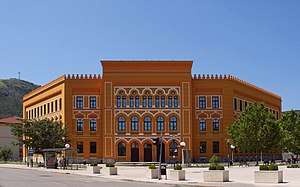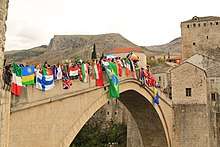United World College in Mostar
The United World College in Mostar (UWC Mostar) is one of 18 schools and colleges around the world in the UWC (United World Colleges) movement. UWC is a global educational movement with the mission to make education a force to unite people, nations and cultures for peace and a sustainable future. The UWC movement was founded in 1962 with the opening of UWC Atlantic College, and now spans 18 schools and colleges across four continents, as well as 155 UWC National Committees who help to select students from their country. The majority of schools and colleges admit students exclusively for the last two years of school in order to complete the internationally recognised IB Diploma programme. A number of schools and colleges also offer a Foundation IB year to help students prepare for the rigorous pre-university course that is the IB Diploma, and several offer opportunities for students as young as 3 to experience an education focused on fostering peace and international understanding.
| United World College in Mostar (UWC) | |
|---|---|
 | |
| Location | |
88000 | |
| Coordinates | 43.343007°N 17.807290°E |
| Information | |
| Type | International Baccalaureate |
| Established | September 2006 |
| President | Elizabeth Rehn |
| Headteacher | Dženan Hakalović (Acting Head) |
| Number of students | 165 up to 200 |
| Affiliation | United World Colleges |
| Website | www.uwcmostar.ba |
The United World College in Mostar (UWC Mostar)(Bosnian/Croatian/Serbian Latin: Koledž Ujedinjenog svijeta u Mostaru) was key founded by Elisatheth Rehn (UN Special Rapporteur on the Secretary General for the United Nations Mission in Bosnia-Herzegovina 1995-1999) and Lamija Tanović (Chair, Humanity in Action Bosnia and Herzegovina) and established in 2006 and officially opened by Queen Noor of Jordan. UWC Mostar is the first UWC with an explicit aim to contribute to the reconstruction of a post-conflict society and also the first to be housed within an existing public school (see also Education in Bosnia and Herzegovina).[1] UWC Mostar is the twelfth college in the United World Colleges family and the fourth college in Europe.
UWC Mostar was founded (key founding members Elisabeth Rehn and Lamija Tanović) as a joint initiative of UWC and the International Baccalaureate Organization with the aim to support the peace process in the country and the region. The college is implementing recognizable model of post-conflict education, practically demonstrating a convincing, fully integrated curriculum, thus offering a milestone for broader educational reform in the county and the region. From January 2011, UWC Mostar is part of Foundation Education in Action which is a legal successor of UWC-IB Initiative in Bosnia and Herzegovina.
Chair of the Governing Board is Pilvi Torsti, Chair of the College Board is Jasminka Bratić (member of Governing Board too.
UWC Mostar (165-200 students) shares the building with Gimnazija Mostar (approx. 650 students). Before the war this school, also known as the Old Gymnasium, built in 1898 - 1902 during the Austro-Hungarian rule in Bosnia and Herzegovina, was one of the finest schools in ex-Yugoslavia.[2] However, as consequence of the Bosnian War, nowadays Gymnasium Mostar teaches two national separate secondary school curricula, intended for Croat and Bosniak students.[3] UWC Mostar students come from all ethnic groups in Bosnia and Herzegovina as well as from the region and abroad.[4] All students live, study and serve the community together creating a unique example of integrated education in post-war Bosnia and Herzegovina.
The college also serves as the Centre for Professional Development of Teachers in Bosnia and Herzegovina who receive training in international educational standards.
The main objectives of UWC Mostar are to:
- Demonstrate a convincing classroom model for a wider education reform in BiH
- Participate in the dialogue on post-conflict education and curricular development in BiH and beyond
- Foster mutual understanding in the City of Mostar.
- Use the social service and activity programme (CAS) to help integration process and community building in Mostar and beyond
Location
The UWC Mostar is located in Mostar, which is the centre of Herzegovina, an historic region of Bosnia and Herzegovina. Mostar is widely known by the famous Old Bridge (Stari Most), originally built in 1566, destroyed by HVO forces during the Bosnian War in 1993 and rebuilt in 2004. Mostar was chosen for hosting UWC as the most striking example of the post-war ethnic division and tensions.
Premises
The UWC Mostar is located in the city center. The classes for UWC Mostar students take place in state-of-the-art science labs (Chemistry, Biology, Physics) and classrooms, including a fully equipped IT room and a spacious library in the attic shared with Gymnasium Mostar. College assemblies and meetings take place in a spacious study room called the "Spanish Room", which is also used as a provisional library and reading room with many periodicals and news magazines for students. The Gymnasium Mostar indoor and outdoor sport facilities, including gym, football/handball pitch, volleyball playground, running track and long jump section, are also on UWC Mostar student disposal. The Visual Arts and Theatre Arts Studios and Music Room, are located within one of the students’ residences.
Unlike most other UWCs, UWC Mostar does not have an isolated campus - students live in three residences in different parts of the City of Mostar, integrating their lives within the community.
IB DP curriculum
UWC Mostar is an IB World School since September 2006. It offers International Baccalaureate Diploma Programme (IB DP) in English. In the school year 2017/2018 UWC Mostar runs these IB Courses:
- IB Group 1 Language A1: Bosnian A1, Croatian A1, Serbian A1, English A1 - Literature, English A1 - Language and literature, German A1; other languages may be taken as "self-taught" subjects.
- IB Group 2 Second Language: English B, French Ab Initio, German B, Spanish B, Spanish Ab Initio.
- IB Group 3 : Economics, History, Psychology, Anthropology, Global Politics, and the interdisciplinary course Environmental Systems and Societies.
- IB Group 4 Sciences: Biology, Chemistry, Physics, and ESS.
- IB Group 5 Mathematics: Mathematical Studies(in one or two years), Mathematics Standard Level, Mathematics Higher Level, Further Mathematics
- IB Group 6 Arts: Visual Arts, Theatre Arts.
Creativity, Action, Service- CAS Programme
The CAS programme at UWC Mostar has the ambitious goal to establish and maintain strong relationships with various local institutions. The UWC Mostar community service programme aims to contribute to the integration processes in Mostar, focusing its efforts on working with underprivileged social groups such as refugees, children with special needs, Romani population, orphans and elderly. Through UWC Mostar CAS Programme, students become more aware of their actions contributing to the process of strengthening the society, making it more connected thus richer. At the same time, students recognize the beneficial impact of CAS activities on their ethical development and maturity. Through joint participation in various CAS projects students learn how to value diversity and difference also fostering youth voluntary action in Mostar and beyond.
Creativities: Model United Nations, Astronomy, School Band, Debating Club, International Cooking, UWC Links Group, AB initio languages, Community Theatre, Visual Arts, Choir, Craft, Robotics, Global Awareness, Mediation, Fashion, School Promotion Group, Improvisational Theatre
Actions: Volleyball, Basketball, Table Tennis, Football, Rugby, Hiking & Cycling, Modern Dance, Ballroom Dance, Yoga, Judo & Taek Won Do,
(Social) Services: Kindergarten Radobolja, SOS Kindergarten and Family Centre, Home for children without parental care "Egyptian Village", Centre for people with special needs "Los Rosales", Caritas’ Centre for children with Special Needs "Holy Family", Primary School for Children with Special Needs, Refugee camp Tasovčić, Ecology Group, UWC Mostar Labs and Library maintenance, IT lab lessons, Mostar Peer Support (MOPS), UWC Mostar Green House, Parent’s Association of children with Special needs "Sunce", Amnesty International Group, Fun with Elderly
Student body

In academic year 2019/2020 the College is attended by 200 students from 67 countries of the world.
Head teachers
- 2006-2010: Paul Regan
- 2010–2018: Valentina Mindoljević
- 2018-2019: Mark Feltham
- 2019-present: Dženan Hakalović (Acting Head)
References
- Hromadzic, Azra (November 2008). "Discourses of Integration and Practices of Reunification at the Mostar Gymnasium, Bosnia and Herzegovina". Comparative Education Review. Special Issue on Education in Conflict and Postconflict Societies. 52 (4): 561. doi:10.1086/591297. JSTOR 10.1086/591297.
- Herzegovina Neretva Canton Tourist Board. "The Old Gymnasium". Archived from the original on 1 April 2013. Retrieved 11 July 2012.
- Pasalic Kreso, Adila (2008). "The War and Post-War Impact on the Educational System of Bosnia and Herzegovina". International Review of Education / Internationale Zeitschrift für Erziehungswissenschaft / Revue Internationale de l'Education. 54 (3–4): 356–357. doi:10.1007/s11159-008-9087-y.
- Hayden, Mary; Jeff Thompson (September 1995). "International Schools and International Education: A Relationship Reviewed". Oxford Review of Education. 21 (3): 336–337. doi:10.1080/0305498950210306. JSTOR . 1050876 .
External links
- Official United World College in Mostar website
- United World College in Mostar
- Скрбич М. Мир под одной крышей. Skrbic M. The World Under One Roof // Transitions Online. 28 February 2007.
- Queen Noor marks the Official Opening of UWC in Mostar // The Royal Family of Jordan. 4 July 2007.
- Дзяўчына з Гомельшчыны пачала вучыцца ў Босніі і Герцагавіне // Гомельская праўда. 2007-09-08. С. 9. Be
- „Weltschule“ in Mostar. "World College" in Mostar. // WienInternational.at. 2007-11-08.
- UWC Graduation Ceremony in Mostar // OneWorld Southeast Europe.